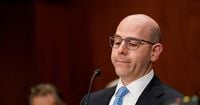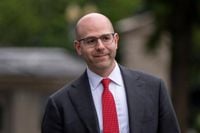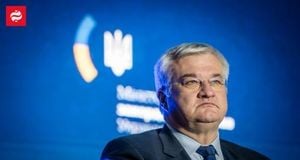As the Senate Banking Committee prepared for a pivotal vote on President Donald Trump’s latest nominee to the Federal Reserve Board, controversy erupted over both ethics disclosures and the nominee’s ongoing ties to the White House. The nominee in question, Stephen Miran, found himself facing pointed questions from Senator Elizabeth Warren and fellow Democrats just hours before the committee’s scheduled decision on September 10, 2025.
At the heart of the issue is a discrepancy in Miran’s financial disclosure forms submitted to the U.S. Office of Government Ethics (OGE). In a February 2025 filing, Miran reported that his spouse had received $1.4 million in income from East Coast Polytechnic Institute (ECPI), a for-profit university. However, in a subsequent OGE filing dated September 3, 2025, the reported spousal income from ECPI dropped sharply to $457,954. This significant change drew immediate scrutiny from Senator Warren, the committee’s top Democrat, who demanded a clear explanation for the disparity.
“Particularly given the history of reputational quality issues, underhanded operations, and opaque funding structures associated with for-profit universities, the nature of your spouse’s — and by extension your — relationship with ECPI deserves full clarity,” Warren wrote in a letter to Miran, as reported by Reuters. She added, “Further, the discrepancy raises questions about the reason for the change and the accuracy of the disclosures in your OGE forms.”
The timing of Warren’s inquiry was no accident. Her letter landed less than 24 hours before the banking committee’s scheduled vote at 10 a.m. EDT on Wednesday, a move that underscored both the urgency and the seriousness of the concerns. For Warren and other Democrats, the issue was not just about paperwork; it was about trust, transparency, and the independence of the Federal Reserve at a time when political pressures on monetary policy are running high.
Warren and her Democratic colleagues have been vocal in their opposition to Miran’s confirmation. Their apprehensions extend beyond the ethics filings, centering on Miran’s continued role as a White House economic advisor. They argue that his refusal to fully sever ties with the administration could compromise his independence if confirmed to the Fed’s Board of Governors. President Trump, after all, has made no secret of his preference for lower interest rates, and critics worry that Miran’s dual roles could blur lines that are meant to protect the central bank’s autonomy.
In a letter following up on Miran’s confirmation hearing the previous week, Warren pressed for more details about both his and his spouse’s relationship with ECPI, as well as several real estate assets listed in his disclosures that were described as "supporting ECPI." The White House and ECPI’s president declined to comment when asked about the matter, leaving the questions swirling as the Senate prepared to act.
Miran, for his part, responded to the committee on September 7, 2025. In his written statement, he asserted that he had “provided all required financial information” to the ethics office and had “entered into an ethics agreement that describes the steps that I will take to avoid any actual or apparent conflict of interest in the event that I am confirmed for the position of Governor of the Board of Governors of the Federal Reserve System.” His response, while firm, did little to quell the concerns of his critics, who argue that transparency and clarity are non-negotiable when it comes to such a powerful and sensitive appointment.
But the ethics filings were not the only issue on the table. Another major concern emerged regarding Miran’s employment status. As reported by Reuters, Miran left open the door to holding his Federal Reserve Board seat while simultaneously remaining on unpaid leave from his position at the White House Council of Economic Advisers. This arrangement, which would break with decades of established practice, has sparked fears about the central bank’s independence from the executive branch.
In written responses to the Senate Banking Committee on September 9, 2025, Miran stated that he planned to take unpaid leave from the White House until the term for which Trump nominated him expires in January 2026. However, when pressed on whether he would resign from his White House post if his Fed appointment were extended beyond that period, Miran declined to commit, saying he would “reevaluate” the arrangement at that time. This lack of a clear commitment has only deepened concerns among lawmakers and outside observers alike.
“This arrangement would break decades of practice and raises questions about the Federal Reserve’s independence,” noted one committee staffer, echoing a sentiment that has been widely shared in policy circles. The prospect of a Fed governor maintaining even a nominal link to the White House is almost unheard of, and critics argue that it could erode public confidence in the central bank’s ability to act without political interference.
The stakes are particularly high given the current economic climate and the pivotal role the Federal Reserve plays in setting monetary policy. With inflation pressures, labor market shifts, and global economic uncertainty, the independence of the Fed is viewed as a bedrock principle by many economists and policymakers. Any perception of undue influence from the White House—especially one as vocal about its monetary preferences as President Trump’s—could have far-reaching consequences for financial markets and the broader economy.
Supporters of Miran’s nomination, primarily among Senate Republicans, have downplayed the controversy. They argue that Miran’s expertise and experience make him a valuable addition to the Fed, and point to his ethics agreement as evidence that he takes conflict-of-interest concerns seriously. Still, the optics of the situation are hard to ignore, and the questions raised by Senator Warren have injected a new level of scrutiny into the confirmation process.
As the clock ticked down to the committee’s vote, the outcome remained uncertain. Would the majority push through the nomination despite the unresolved questions, or would the mounting concerns prompt a pause for further investigation? Either way, the episode has served as a stark reminder of the delicate balance between politics and policy at the highest levels of government—and the vital importance of transparency and independence in institutions like the Federal Reserve.
While Miran insists he has complied with all disclosure requirements and stands ready to honor his ethics commitments, the controversy shows no signs of fading. For now, all eyes are on the Senate Banking Committee—and on the future of one of the nation’s most influential economic institutions.





